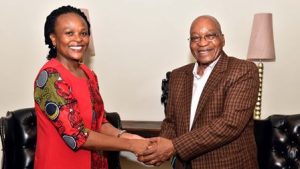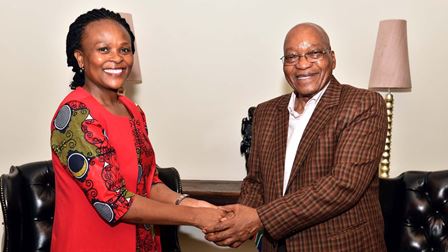In her answering affidavit filed in the high court in Pretoria on Friday, Mkhwebane said her draft remedial action directed Zuma to set up a judicial commission of inquiry.

“From the discussion during our meeting (with Zuma) I became concerned that my draft remedial action to direct the president to establish a judicial commission may face similar difficulties as currently faced in the State of Capture report,” reads Mkhwebane’s affidavit.
Mkhwebane’s admission on the Absa matter comes as she has again been accused of ordering “irrational and unlawful” remedial action. The Department of Arts and Culture is also dragging Mkhwebane to the high court in a bid to review and set aside a report she released in June.
Mkhwebane said she changed the draft CIEX remedial action after the meeting with Zuma in April because there was already a pending legal determination. This was the president’s application to review her predecessor Thuli Madonsela’s State of Capture report, which also ordered Zuma to set up a judicial commission of inquiry.
In this application, Zuma wants the high court to determine whether the public protector’s office can direct him to establish a commission of inquiry.
The SARB and Absa also want Mkhwebane’s report that Absa must pay back R2.25bn, including interest, for the lifeboat given to Bankorp to be reviewed and set aside.
Mkhwebane’s remedial action directing Parliament to amend the constitution and change the SARB’s mandate was set aside in August.
In its replying affidavit, the SARB’s Johannes de Jager said that despite its being standard procedure, Mkhwebane had not provided a transcript of the meeting with Zuma in which she dropped the remedial action directing the president to set up a judicial commission of inquiry.
“The only explanation that the public protector gives about the subject matter of the meeting is not credible,” reads De Jager’s replying affidavit.
According to De Jager, the draft remedial action did not direct Zuma to establish a commission of inquiry, but required him only to consider establishing one.
Both the SARB and Absa want the court to indicate its displeasure at improper and unreasonable conduct and order Mkhwebane to pay for their legal costs from her own pocket.
The SARB said Mkhwebane deserved serious censure for her conduct.
“She claims that during a meeting with the president in April 2017 she became concerned about remedial action that would direct him to establish a commission of inquiry, but by that stage she had already proposed remedial action that accounted for this concern and therefore required the president only to consider appointing a commission of inquiry,” said De Jager.
On the Department of Arts and Culture report, Mkhwebane nailed the department for failing to implement a settlement agreement it signed in April 2014 with the SA Roadies Association (Sara), a Joburg-based organisation that trains young people in live events and technical skills.
The department was ordered to renovate Sara’s headquarters to the tune of R15million as the parties agreed in 2014.
Mkhwebane found that the department unfairly discriminated against the association by not funding its operational and administrative costs, saying that allocating funds to Sara would benefit scores of youth.
Vusithemba Ndima, the department’s deputy director-general responsible for heritage preservation and promotion, has filed papers in the high court in Pretoria for Mkhwebane’s report to be set aside.
Ndima said Mkhwebane’s report was unlawful because the 2014 agreement served as remedial action. Unless set aside by the court, the public protector’s recommendations are binding.
“Her remedial action in this regard is irrational and unlawful, and stands to be reviewed and set aside,” Ndima said.
“I am advised that the public protector committed a serious procedural irregularity and acted outside of her powers by issuing a further report and taking remedial action when the office had already taken remedial action in the form of mediation, which resulted in the conclusion of the settlement agreement.”
It now appears the department no longer wants to implement the agreement, which was facilitated by Deputy Public Protector Kevin Malunga.
Ndima said the department had told Sara and Malunga in a meeting on April 29, 2016 that it was unable to implement the agreement. “The Cultural Promotions Act does not provide for the development and maintenance of property that is not acquired by the state,” Ndima said.
“The department has made various attempts to resolve the disputes, including a request from me that the settlement agreement be amended. This request was however ignored by Sara and the public protector.”
Ndima also accused Mkhwebane of refusing to consider evidence provided to her during investigations.
Mkhwebane’s spokesperson Cleopatra Mosana said she was opposing the application.

